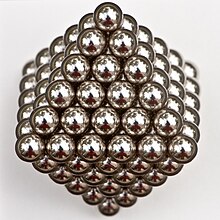146 (number)

| ||||
|---|---|---|---|---|
| Cardinal | one hundred forty-six | |||
| Ordinal | 146th (one hundred forty-sixth) | |||
| Factorization | 2 × 73 | |||
| Divisors | 1, 2, 73, 146 | |||
| Greek numeral | ΡΜϚ´ | |||
| Roman numeral | CXLVI, cxlvi | |||
| Binary | 100100102 | |||
| Ternary | 121023 | |||
| Senary | 4026 | |||
| Octal | 2228 | |||
| Duodecimal | 10212 | |||
| Hexadecimal | 9216 | |||
146 (one hundred [and] forty-six) is the natural number following 145 and preceding 147.
In mathematics
[edit]146 is an octahedral number, the number of spheres that can be packed into in a regular octahedron with six spheres along each edge.[1] For an octahedron with seven spheres along each edge, the number of spheres on the surface of the octahedron is again 146.[2] It is also possible to arrange 146 disks in the plane into an irregular octagon with six disks on each side, making 146 an octo number.[3]
There is no integer with exactly 146 coprimes less than it, so 146 is a nontotient. It is also never the difference between an integer and the total of coprimes below it, so it is a noncototient.[4] And it is not the sum of proper divisors of any number, making it an untouchable number.[5]
There are 146 connected partially ordered sets with four labeled elements.[6]
See also
[edit]References
[edit]- ^ Sloane, N. J. A. (ed.). "Sequence A005900 (Octahedral numbers)". The On-Line Encyclopedia of Integer Sequences. OEIS Foundation.
- ^ Sloane, N. J. A. (ed.). "Sequence A005899 (Number of points on surface of octahedron)". The On-Line Encyclopedia of Integer Sequences. OEIS Foundation.
- ^ Sloane, N. J. A. (ed.). "Sequence A079273 (Octo numbers)". The On-Line Encyclopedia of Integer Sequences. OEIS Foundation.
- ^ Sloane, N. J. A. (ed.). "Sequence A058763 (Integers which are neither totient nor cototient)". The On-Line Encyclopedia of Integer Sequences. OEIS Foundation.
- ^ Sloane, N. J. A. (ed.). "Sequence A005114 (Untouchable numbers, also called nonaliquot numbers: impossible values for the sum of aliquot parts function)". The On-Line Encyclopedia of Integer Sequences. OEIS Foundation.
- ^ Sloane, N. J. A. (ed.). "Sequence A001927 (Number of connected partially ordered sets with n labeled points)". The On-Line Encyclopedia of Integer Sequences. OEIS Foundation.
